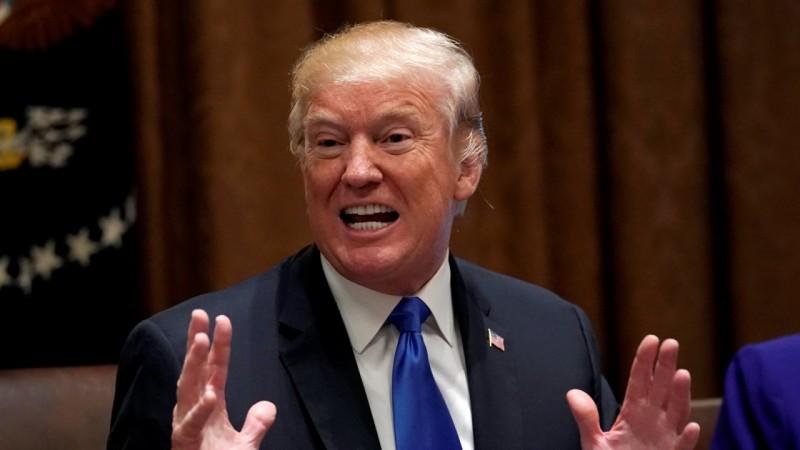
US President Donald Trump kept his word on launching the long promised trade war (of honor) against China, but the backlash followed soon even as the real impact of the move on China remained doubtful. Trump announced punitive tariffs of 25 percent on steel and 10 percent on aluminium on Thursday. The timing of the announcement was special -- Chinese President Xi Jinping's top economic adviser was in Washington to hold discussions on trade disputes.
"Our Steel and Aluminum industries (and many others) have been decimated by decades of unfair trade and bad policies from around the world. We must not let our country, companies and workers be taken advantage of any longer. We want free, fair and SMART TRADE!" Trump said.
In the immediate aftermath the US markets fell over 5 percent. Then a host of key trade partners like Canada, the EU, Mexico, China and Brazil said they would consider retaliatory tariffs against US imports.
Some of the responses here:
"We will not sit idly while our industry is hit with unfair measures that put thousands of European jobs at risk" -- European Commission President Jean-Claude Juncker
"Should restrictions be imposed on Canadian steel and aluminum products, Canada will take responsive measures to defend its trade interests and workers." -- Canadian Foreign Minister Chrystia Freeland
"The 25 percent across-the-board tariff on foreign steel is ill-advised and naive ... It will inevitably invite retaliation from America's most reliable allies, ultimately hurting American non-manufacturing industries as well." -- Tadaaki Yamaguchi, chairman of the Japan Steel Information Center.
While Brazil said "multilateral or bilateral" action will be taken to protect its interests, Australia's trade minister said the Trump tariffs would distort trade and lead to job losses.
China is far from being vulnerable
However, in China, which is the primary target of Trump's anti-dumping rhetoric, the reaction was muted. China basically shrugged off the vaunted decision. According to the BBC, a high-ranking official of China Iron and Steel Association said: "Nothing can be done about Trump. We are already numb to him."The official added that the impact of the new tariff would not be big.
That doesn't, however, mean that China has run out of options. Rather the opposite. First of all, China is far from being vulnerable to a tariff war unleashed by the US. Whenever it was hit with tariffs, China has responded in kind, inflicting equal or greater pain on the US. When President Obama imposed 35 percent tariff on Chinese tires, China retaliated with steep penalties on US chicken legs. While the tire tariff saved the US about 1,000 jobs, the chicken parts ban caused a loss of $1 billion.
A Brookings Institution study points out that the importance of the American market for China has declined and that Chinese exports to the US account for only 3 percent of its GDP. In the case of steel, China is only the 11th largest exporter to the US. That means there are ten larger steel exporters, including staunch US allies like Japan and South Korea.
Yet another reason why the tariff war will not cripple China is that its dependence on exports is progressively declining. The analysis also disproves the theory that China will be timid in the face of a US onslaught."Xi gains politically in Beijing by standing firm against U.S. pressure and punching back against punitive measures. Historically, China has always retaliated proportionately to U.S. trade actions."
And finally, China has ample room for retaliatory measures against the US. China is the second-largest market for agricultural products from the US. Higher tariffs on soybean and corn are likely to be imposed in the wake of the steel duties announced by Trump. Another crop is the sorghum grains, the top Chinese grain imports from the US. China has already started an investigation into the US government subsidies for sorghum, mainly a livestock feed that is in great demand in China for its use in the production of local beverages.
On a different plane, China can also use its position as the biggest creditor to the US government. Though it involves complexities, a Chinese reaction to the tariff move will be a slowing down of the purchase of US treasuries.
As the top exporter, China's foreign exchange surpluses have been soaring in the past several years. Of its humungous foreign currency reserves of $3.14 trillion, as much as $2 trillion is held in US dollars. China has been a generous buyer of the US government bonds, with a stash of about $1.2 trillion as of now. A Chinese cutback on the treasury purchase means the US government will have one less creditor. With fewer takers of its bonds -- which it sells to fund the government programmes -- the yields will rise and the impact will spill over, eventually making borrowing tougher across the economy.









!['Had denied Housefull franchise as they wanted me to wear a bikini': Tia Bajpai on turning down bold scripts [Exclusive]](https://data1.ibtimes.co.in/en/full/806605/had-denied-housefull-franchise-they-wanted-me-wear-bikini-tia-bajpai-turning-down-bold.png?w=220&h=138)



